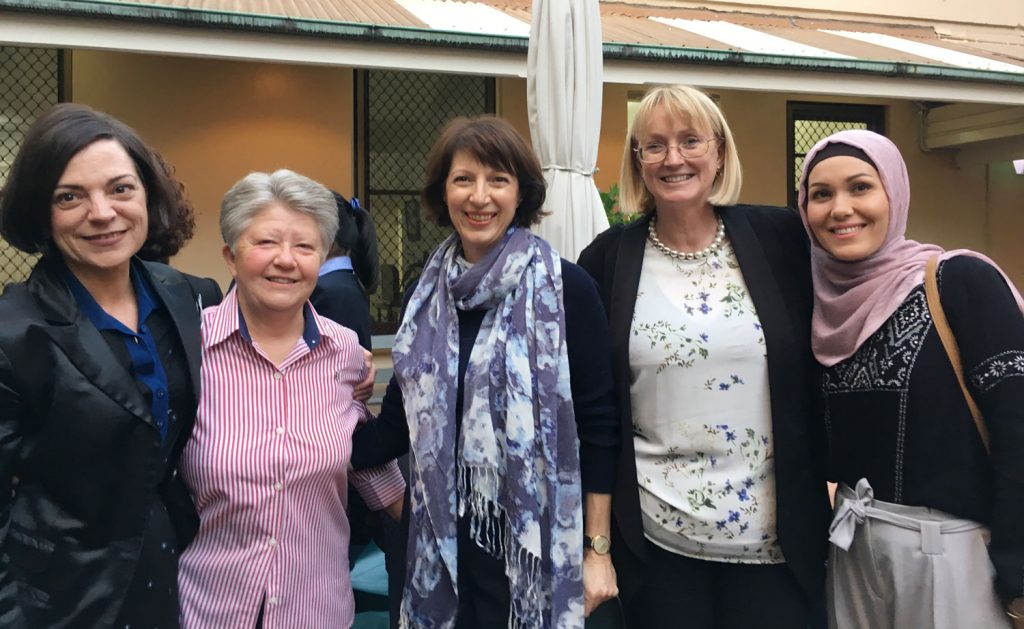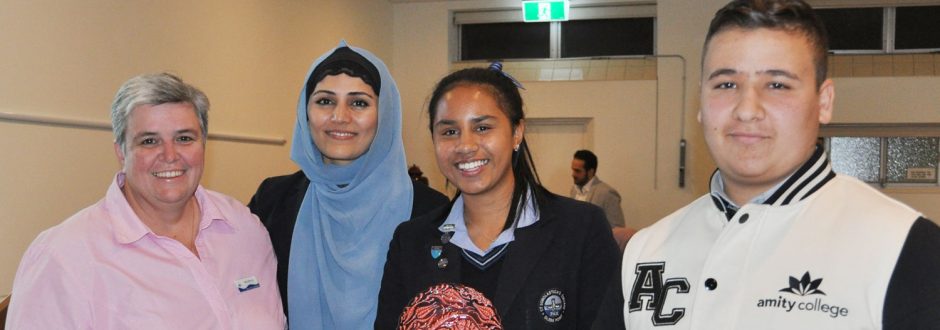Finding common ground over a shared meal in the holy month of Ramadan, provided an opportunity for the Islamic and Good Sams communities to reflect on mercy.
BY The Good Oil
On the second day of Ramadan, earlier this month, the Good Samaritan community joined with members of the Islamic community at St Scholastica’s College in Glebe to share in a traditional Muslim Iftar dinner. It was the second time the communities had gathered together, with the inaugural dinner held last year at the Mount St Benedict Centre.
Iftar, is the “breaking of the fast” meal eaten at sunset over the 40 days of Ramadan, and an initiative by the Affinity Intercultural Foundation is encouraging community Iftar dinners between Muslim and non-Muslim people with the aim of “breaking down stereotypes and prejudices”.
When it came to identifying a theme for the evening, Good Samaritan Sisters’ Director of Operations Natalie Acton said both religious traditions offered a rich history of teachings to draw on.
“When we met with Affinity’s Executive Director Ahmet Orhan Polat to plan the event, it was in the aftermath of the tragic events in Christchurch,” said Natalie. “As we reflected on these events, and then only a week or so later Sri Lanka, we thought that this was a moment in time where the world deeply needs the balm of mercy.”
“We drew on the words of our founder Archbishop Polding who encouraged the Sisters to be ‘ministers of mercy’ as we felt that this imperative was particularly pertinent in this time and place,” she said. “The invitation to receive and be agents of God’s mercy is common in both the Christian and Islamic traditions and is more relevant than ever.”

Jennifer Solari, Sister Sue Hill SGS, Carolyn Walker, Kate Rayment and Affinity representative. Photo: Fran Vella.
Speaking at the dinner, Good Samaritan Sister Meg Kahler SGS said Archbishop Polding identified the various ways we are to “pour out mercy to the world – in schools, visiting and helping the sick in their own homes or in hospitals, instructing people in the faith, conducting orphanages, working with penitent women and applying ourselves ‘to every other charitable work’”.
“But most importantly of all, Polding tells Good Samaritans that as we ‘imitate the charity of the kind Samaritan who was moved with pity at the poor wounded man’, and then did all he could to help him, we are to use ‘all gentleness and compassion’ for those we tend. There is tenderness and care. There is mercy,” Meg said.
“From our scriptural base and in the Christian tradition, mercy is a practical action – undertaken because we are constantly receiving mercy ourselves.
“The Christian tradition draws on Jesus’ example of mercy to give us the corporal works of mercy – the practical call for Christians to feed the hungry, give drink to the thirsty, clothe the naked, shelter the homeless, visit the sick, support the imprisoned and bury the dead. Our friend St Benedict writes a chapter in his Rule called the Tools of Good Works which add more actions to this already extensive list but acknowledges that we are prone to failure by ending with the last tool of good work – to never lose sight of God’s mercy,” she said.
“Polding sums it up when he reminds us that as God has so generously blessed us, forgiven us, and loves us in spite of our failings, because we have been so generously been dealt with, so should we deal with all those we encounter. And to quote him directly, ‘Do we not feel a call to become ministers of God’s mercy and messengers of his compassion?’.”
Dr Mahsheed Ansari, who is a lecturer at the Centre for Islamic Studies and Civilisations at Charles Sturt University, also gave a keynote address at the dinner attended by over 70 people including senior students and staff of Amity Islamic College in Prestons and senior students and staff from St Scholastica’s College.
“Mercy is necessary to God’s essential nature,” said Dr Ansari. “That is why it was revealed 114 times in the Qur’an.”
“Belief, life, creation, prophets and revelation are all manifestations of his mercy and are embodiments of mercy themselves. Believers are encouraged to embody this divine attribute within themselves and towards all of creation,” she said.
“The prophet Muhammad encouraged Mercy: ‘Be merciful to those on earth and the One above the heavens will have mercy upon you’.”
Director of Mission at St Scholastica’s College, Fran Vella, said the students highly valued the opportunity to dialogue with students from Amity.
“Many of our students have commented on the opportunity to develop a better understanding of each other’s religions and traditions,” said Fran. “The Studies of Religion (SOR) students from both colleges found it particularly helpful to get a ‘first-hand’ understanding of many aspects of the content they are learning in class.”
Year 11 St Scholastica’s student Lauren Daulz said, “The night made me realise that at the core of our respective religious traditions lies the same sentiments of mercy, peace and love for all”.
“The keynote speakers simplified the core values of both Christianity and Islam which showed that our values were either similar or same. As an SOR student this experience has increased my knowledge about the Islamic faith but has also made me anticipate learning more about this religious tradition later this term,” said Loan Pham, also in Year 11 at St Scholastica’s.
“The Iftar dinner was an amazing opportunity to experience an Islamic tradition,” reflected Year 11 St Scholatica’s student Mariam Kirakosyan. “On my table there were people of many different ethnicities and faiths. Throughout the night we shared stories of each of our personal experiences living in Australia as someone with a different background, and bonded over our common human experience.”
“By the end of the night, I made wonderful new friends, shared a delicious meal, and learned a beautiful lesson: every person on earth is different, but the one thing we all share is the human capacity for compassion.”
